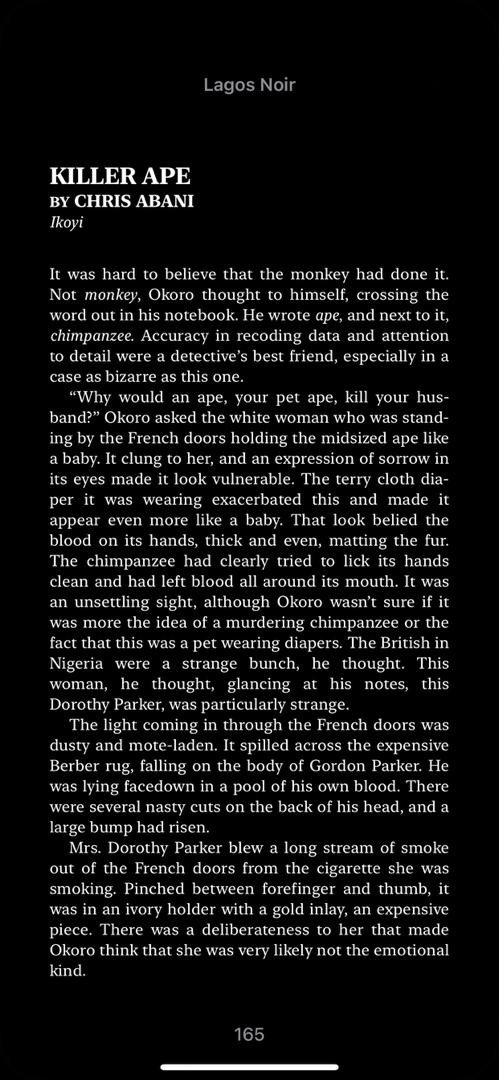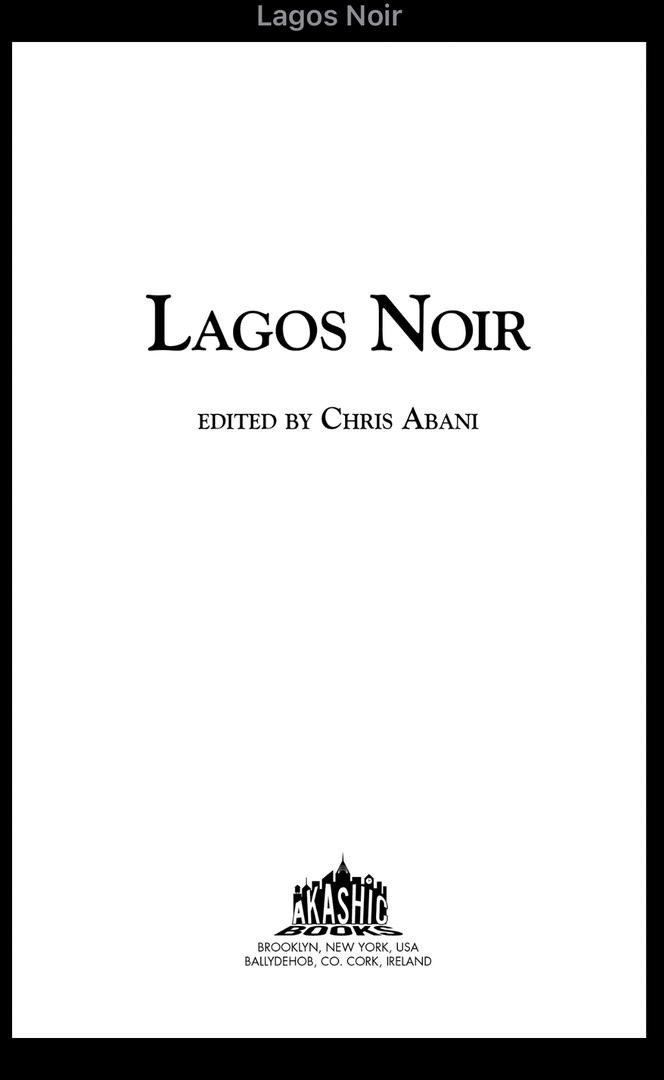Book Review: Killer Ape
In my last post in this community, I shared a review of a short story by an African writer. I like to think I'm in my short story era. At first I thought I was “consuming” short stories because they were recommended texts for school. However, I have realized that I am not only bound to reading them because of school, but also because I am an avid book reader. Even after school, I still continued reading books, particularly short stories. Currently, I have two collections of short stories; Lagos Noir by Chris Abani and The Thing Around Your Neck by Chimamanda Ngozi Adichie. These collections of short stories were recommended by my lecturer, and one thing I can assure you is that they are fully loaded with nice and insightful stories, exploring different themes; from parenting to bad governance, murder and so on. So, if you're a book lover, I recommend you read the short stories in The Thing Around Your Neck and Lagos Noir.

In this post, I'll be reviewing one of the short stories in Lagos Noir—Killer Ape by Chris Abani. Chris Abani is a Nigerian American author. He attended the university of California where he got his degrees. Chris Abani is one of the courageous writers who dared to taunt the government. Because of his involvement in politics through his writings, he was arrested and imprisoned in 1985. This short story isn't the first work of Chris that I have read. I also recently read one of his novels—Becoming Abigail. Killer Ape by Chris takes readers on a profound exploration of muder, homosecuality, racism and justice.
PLOT SUMMARY
Killer Ape by Chris Abani revolves around James Okoro who is a detective in the police department. The story is set in post-colonial Nigeria where pangs of colonialism still linger. Despite being a detective, James Okoro often gets overwhelmed and sidelined by the white officers who are his superiors. Now, here’s where things get interesting—James Okoro is a fan of Sherlock Holmes. Sherlock Holmes is a fictional detective who is good at what he does. You know how we watch movies and we see fictional characters and then we try to be like them? It reminds me of my childhood days when I wanted to be like spiderman, I would dress like him and try to shoot webs out of my hands. The same thing is similar to James Okoro. He adores Sherlock Holmes.

The plot gets interesting when there is a muder in the Parker household. Apparently Mr Parker is murdered. What is more interesting is that Mrs Parker claims that their pet, an ape, murdered Mr Parker. When I first read this part, I paused and read the part again. How was it possible that an ape (or a monkey) would murder a man? Well, I gave the plot the benefit of a doubt and continued reading. It turns out that Mr Parker and his houseboy, Emmanuel, had a sexual relationship. This is where the theme of homosecuality comes in. Mr Parker is married to Mrs Parker, yet, he gets involved in a sexual relationship with another person. Not just any other person, but a man who is their houseboy.
Mrs. Parker finds out about the relationship between her husband and Emmanuel. She pretends to go out, then returns to find them in an awkward position. She picks up a meat skillet and kills her husband, then blames everything on the ape. Detective Okoro, inspired by the methods of his favorite fictional character, Sherlock Holmes, uncovers the entire truth. He discovers that Emmanuel and Mr. Parker were involved, that Mrs. Parker killed her husband because of this, and that the ape is innocent. However, instead of sending Mrs. Parker to jail, he decides to let the case die and allows the ape to take the blame.

MY NOTES
Generally, the plot is great and interesting. I love how the author started the story. I mean, who would read a story about an ape murdering a human being and not be intrigued enough to finish it? However, what baffles me is the resolution. Detective James solves the puzzle—he realizes that the ape didn’t commit the murder and that it was Mrs. Parker who killed her husband. Yet, instead of reporting the case and earning a promotion, he decides to bury the truth and blame the ape.
Why do you think this is?
While analyzing the story in class, my friends and I had different interpretations. Some argued that Detective James, being a homosexual himself, decided to cover up the truth to avoid exposing Emmanuel. If the truth got out, everyone would know about Emmanuel and Mr. Parker. Others believed that Detective James buried the truth because he thought that’s what Sherlock Holmes would have done.
I recommend you read this short story. Maybe you’ll figure out why Detective James did what he did.
Thumbnail generated using MetaAi.
Posted Using INLEO
It is an interesting story. I was surprised by the fact that the detective decided to take the wife's story. I imagine it's all about the burden. The burden she had to face. The story has an amazing, remarkable, twist I would say. :)
So many twists! Sounds like a good story to check out.
!PIMP
Congratulations @justfavour! You have completed the following achievement on the Hive blockchain And have been rewarded with New badge(s)
You can view your badges on your board and compare yourself to others in the Ranking
If you no longer want to receive notifications, reply to this comment with the word
STOPStarting with a monkey supposedly committing a murder... wow, what a way to hook! And the twist at the end is what got me thinking. The detective solving the whole mystery and then ultimately deciding to blame the poor animal is crazy. You've definitely won me over. I'm keeping an eye on the book because now I need to know what impression it gives me. Thanks for the recommendation.